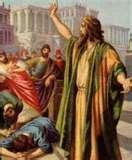Myspace Layouts at Pimp-My-Profile.com / Save me
The name Jonah (Hebrew: Yonah) means "dove." He was the son of Amittai, of the tribe of Zebulun (Joshua 19:13), and from the city of Gath-hepher which is in the region of Galilee. It is believed by some of the Jewish Rabbins that Jonah is to be identified with the dead son of a widow from Zarephath who was raised to life by Elijah (I Kings 17), however there is no basis at all for such an assumption. In II Kings 14:25 Jonah is mentioned as being a prophet of God during the reign of King Jeroboam II (793-753 BC). Jonah foretold of the wide extent of this king's conquests and the expansion of Israel's territory under his leadership.As a result of the above very popular prophecy, which was fulfilled in a relatively short time, "Jonah must have enjoyed great popular respect as a true prophet .... this may explain his reluctance to accept a less popular commission .... and cause him to lose substantial face" (New Layman's Bible Commentary).Technically, the book of Jonah is anonymous, however Jewish tradition holds that the author is Jonah himself. In more recent years it has come to be believed that "the book is about Jonah rather than by him." "It is chiefly a book about a prophet instead of being a collection of oracles of the prophet. Only eight words are needed to report Jonah's preaching -- Jonah 3:4" (Jack P. Lewis).Jonah is the only "minor prophet" ever to be mentioned by Jesus Christ. He is also the only OT figure that Jesus Himself likens unto Himself (Matthew 12:39-41; 16:4; Luke 11:29-32). Although some contend this book is a fable and that Jonah never actually lived, the biblical evidence is to the contrary. II Kings 14:25 speaks of him as an actual historical figure. So does Jesus Christ. Josephus (an early Jewish historian) also regarded him as historical rather than fictional (Antiquities of the Jews, Book 9, Chapter 10, Sections 1-2). Also, when Paul wrote that Jesus "was buried, and that He was raised on the third day according to the Scriptures" (I Corinthians 15:4), he may well have been alluding, at least in part, to Jonah's experience.The intertestamental writers (The Apocrypha) also regarded Jonah as an actual historical figure. He is listed among "The Twelve Prophets" in Sirach 49:10. Tobit 14:4 refers to "God's word which was spoken by Jonah against Nineveh" (although the Codex Sinaiticus reads "Nahum" at this location rather than "Jonah"). In III Maccabees 6:8 the deliverance of Jonah is one in a series of God's great acts of mercy of the past that forms a part of the prayer of Eleazar.The Greeks have long expressed their deep veneration for the prophet Jonah. In the 6th century AD they dedicated a church to him --- (compare this action with what Peter sought to do in Luke 9:33).